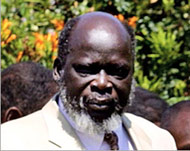Sudan final deal ‘likely by Friday’
The Sudanese government and the country’s main rebel group are locked in tough negotiations in Kenya as President Umar al-Bashir says a final deal would be reached by Friday.

Bashir said in Khartoum late on Tuesday that he expected the long-awaited deal to be signed “today, tomorrow or the next two days,” state radio reported on Wednesday along with both pro-government and independent Khartoum dailies.
“Peace Agreement To Be Signed Today,” ran the jubilant if not entirely accurate headline in several papers, a day after an impatient United States, which had briefly withdrawn from the process, redeployed a diplomat to the peace talks in the Kenyan town of Naivasha to exert more pressure on both sides.
A spokesman for the rebel Sudan People’s Liberation Army (SPLA), Yasir Arman, told AFP from Naivasha, 80km northwest of Nairobi: “SPLA welcomes any efforts that would make a final agreement as soon as possible. We view Bashir’s assurances (of a deal by Friday) in that light.”
Breakthrough
Press reports in Sudan explained that a breakthrough came after the SPLA abandoned demands for non-Muslim residents of the capital Khartoum to be subject to secular rather than Islamic Sharia law during a promised six-year interim period of southern autonomy leading up to a referendum.
Bashir said Khartoum “will have only one legislation after the
movement (SPLA) agreed to non-application of two laws after we gave them convincing guarantees regarding the cultural and religious diversities among the citizens.”
But Arman denied that there was an agreement, and reading from an SPLA statement he said: “The government is still adamant to apply the Islamic law on Christians and non-Muslims in the capital.”
 |
|
John Garang: Leader of rebel |
The two sides have been hotly contesting the nature of laws to govern Khartoum since mediators announced last week that Vice President Ali Usman Taha and rebel chief John Garang had broadly agreed on a power-sharing formula and on how three disputed regions are to be administered.
The regions – Abyei, Nuba Mountains and Southern Blue Nile – largely inhabited by SPLA supporters, were designated to be part of the north by colonial maps.
‘Tremendous gain’
Bashir said the government had also made “several concessions” in its bid to achieve the “tremendous gain” of a peace deal.
He said Khartoum had accepted special security arrangements
under which 1500 SPLA fighters would be stationed in the capital.
The Sudanese media said Taha and Garang had met late into
Tuesday night in Naivasha in a bid to finalise a deal. The progress in the talks came as Washington announced that it had sent its special adviser Jeff Millington back to the talks after pulling him out on Saturday.
|
“[Khartoum] will have only one legislation after the movement (SPLA) agreed to non-application of two laws after we gave them convincing guarantees regarding the cultural and religious diversities among the citizens” Umar al-Bashir, |
Millington was returning to “send another message to the two
sides that it’s time to make the decisions,” State Department
spokesman Richard Boucher announced late on Tuesday.
Washington had wanted an agreement by the end of last year to halt the civil war, which has claimed at least 1.5 million lives and displaced four million people since 1983 in Africa’s largest country.
Self-rule
Previous rounds of talks yielded an agreement on a six-year
self-rule period for the south before a referundum on whether the region would secede or remain part of Sudan.
Khartoum also agreed to exempt the south, where most inhabitants practise Christian or traditional faiths, from Islamic laws.
A deal has also been struck on the withdrawal of government
troops from the southern region, as well as on the creation of
integrated military units and the sharing of the national wealth, notably oil revenues.